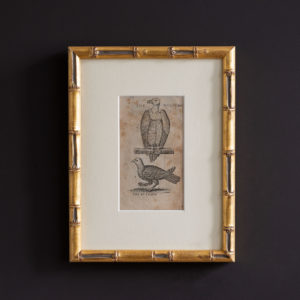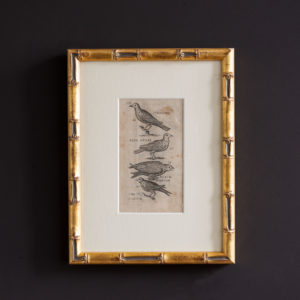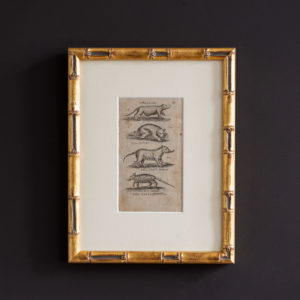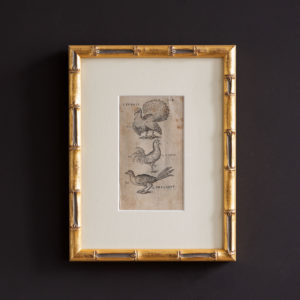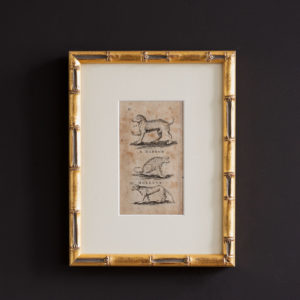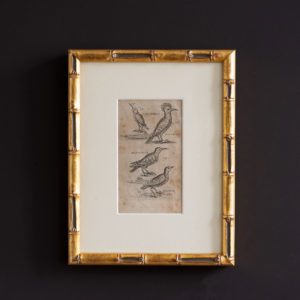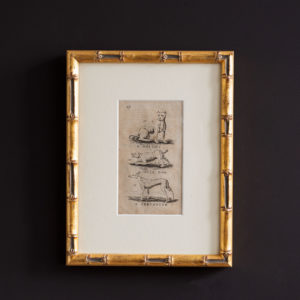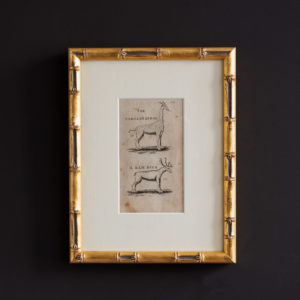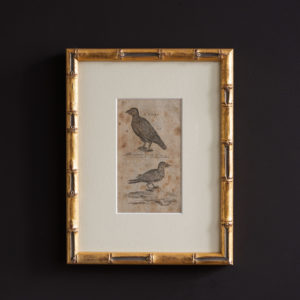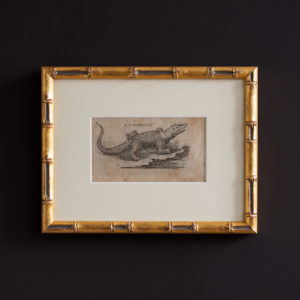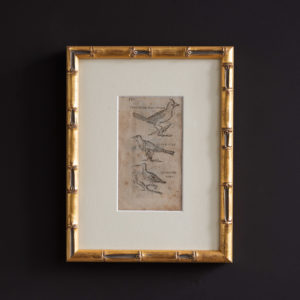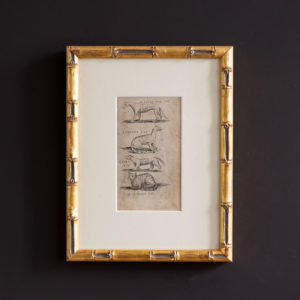546 items found
Page 5 of 6
-
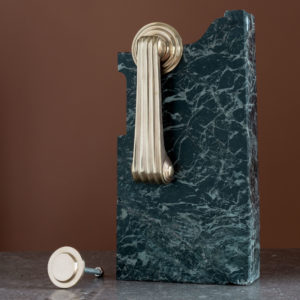
A Stylish Brass Door knocker. Early twentieth century.
£200A Stylish Brass Door knocker. Early twentieth century.
The brass door knocker, with a reeded circular fixing plate, and tapered reeded knocker flanked by smaller reeded decorative plates, and new strike plate.£200 -
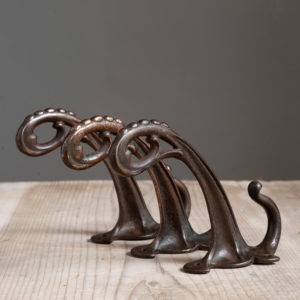
Set of three Art Nouveau coat hooks,
£200 the set -
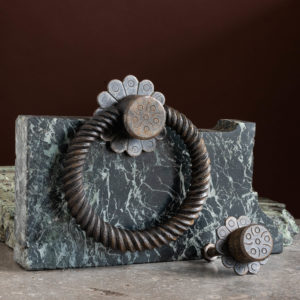
Iron door knocker,
£200 -
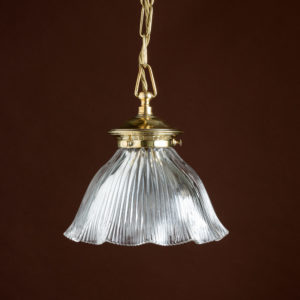
Edwardian ‘Holophane’ glass pendant light,
£200 -
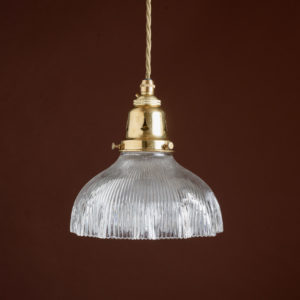
Early twentieth century moulded glass pendant light,
£200Early twentieth century moulded glass pendant light,
with brass gallery and ceiling rose, re-wired.£200 -
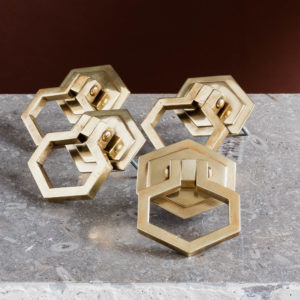
Art Deco brass pulls,
£200 eachArt Deco brass pulls,
Having a hexagonal shaped backplate with a raised smaller hexagonal section with angular drop pull attached. Each stamped N B 574£200 each -
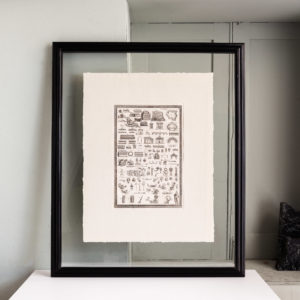
Piranesi, Diverse maniere d’adornare i cammini ed ogni altra parte degli edifizi desunte dall’architettura egizia, Etrusca e Greca,
£200Piranesi, Diverse maniere d’adornare i cammini ed ogni altra parte degli edifizi desunte dall’architettura egizia, Etrusca e Greca,
Giovanni Battista Piranesi, was an etcher, engraver, designer, architect, archaeologist, and theorist.£200 -
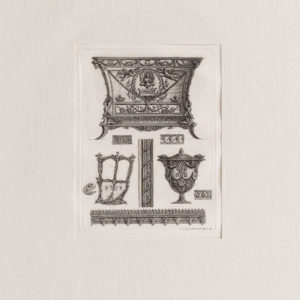
Piranesi, Designs for furniture, 1769
£200Piranesi, Designs for furniture, 1769
Giovanni Battista Piranesi, was an etcher, engraver, designer, architect, archaeologist, and theorist.£200 -
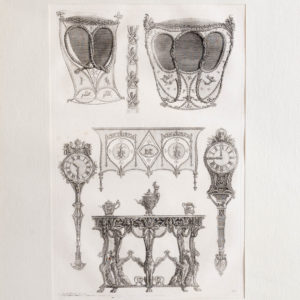
Piranesi, Designs for furniture, 1769
£200Piranesi, Designs for furniture, 1769
Giovanni Battista Piranesi, was an etcher, engraver, designer, architect, archaeologist, and theorist.£200 -
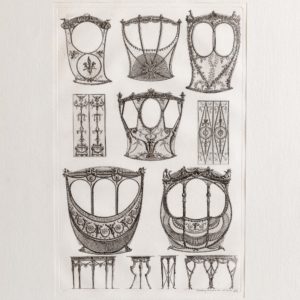
Piranesi, Designs for furniture, 1769
£200Piranesi, Designs for furniture, 1769
Giovanni Battista Piranesi, was an etcher, engraver, designer, architect, archaeologist, and theorist.£200 -
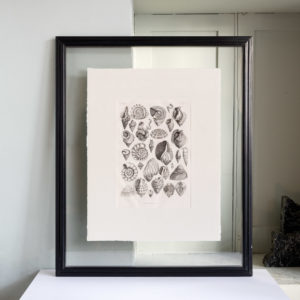
Piranesi, Different shells thought to inspire the forms of Etruscan vases, 1769
£200Piranesi, Different shells thought to inspire the forms of Etruscan vases, 1769
Giovanni Battista Piranesi, was an etcher, engraver, designer, architect, archaeologist, and theorist.£200 -
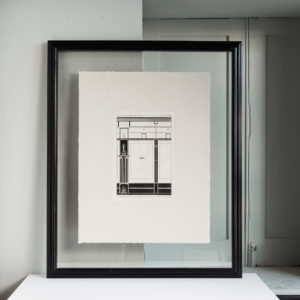
Pompei Interior, copper-engravings published 1796
£200 -
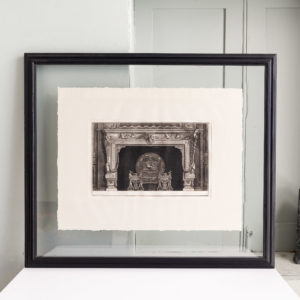
Giovanni Battista Piranesi, Design for a Fireplace, published 1769.
£200Giovanni Battista Piranesi, Design for a Fireplace, published 1769.
Giovanni Battista Piranesi, was an etcher, engraver, designer, architect, archaeologist, and theorist.£200 -
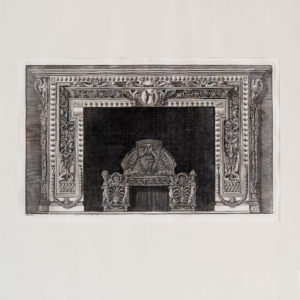
Giovanni Battista Piranesi, Design for a Fireplace, published 1769.
£200Giovanni Battista Piranesi, Design for a Fireplace, published 1769.
Giovanni Battista Piranesi, was an etcher, engraver, designer, architect, archaeologist, and theorist.£200 -
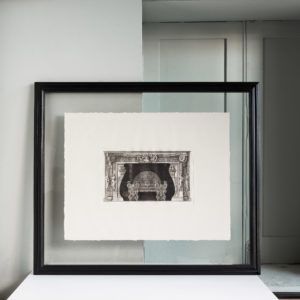
Giovanni Battista Piranesi, Design for a Fireplace, published 1769.
£200Giovanni Battista Piranesi, Design for a Fireplace, published 1769.
Giovanni Battista Piranesi, was an etcher, engraver, designer, architect, archaeologist, and theorist.£200 -
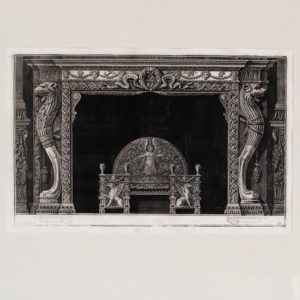
Giovanni Battista Piranesi, Design for a Fireplace, published 1769.
£200Giovanni Battista Piranesi, Design for a Fireplace, published 1769.
Giovanni Battista Piranesi, was an etcher, engraver, designer, architect, archaeologist, and theorist.£200 -
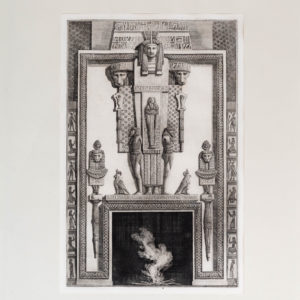
Giovanni Battista Piranesi, Design for an Egyptian style Fireplace, published 1769.
£200Giovanni Battista Piranesi, Design for an Egyptian style Fireplace, published 1769.
Giovanni Battista Piranesi, was an etcher, engraver, designer, architect, archaeologist, and theorist.£200 -
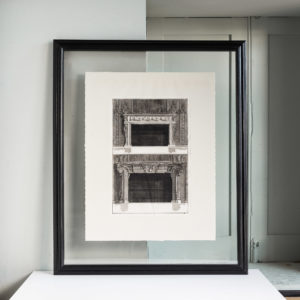
Giovanni Battista Piranesi, Designs for two Fireplaces, published 1769.
£200Giovanni Battista Piranesi, Designs for two Fireplaces, published 1769.
Giovanni Battista Piranesi, was an etcher, engraver, designer, architect, archaeologist, and theorist.£200 -
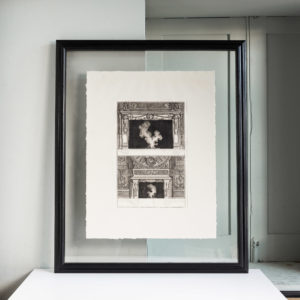
Giovanni Battista Piranesi, Designs for two Fireplaces, published 1769.
£200Giovanni Battista Piranesi, Designs for two Fireplaces, published 1769.
Giovanni Battista Piranesi, was an etcher, engraver, designer, architect, archaeologist, and theorist.£200 -
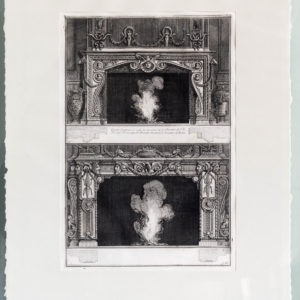
Giovanni Battista Piranesi, Designs for two Fireplaces, published 1769.
£200Giovanni Battista Piranesi, Designs for two Fireplaces, published 1769.
Giovanni Battista Piranesi, was an etcher, engraver, designer, architect, archaeologist, and theorist.£200 -
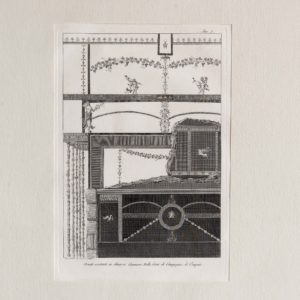
Pompei Interior, copper-engravings published 1796
£200 -
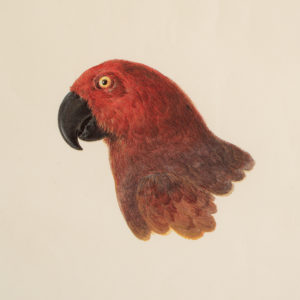
Parrot Heads after Aert Schouman, ‘The great Lory-Parrot’,
£195 each -
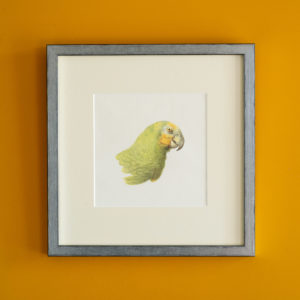
Parrot Heads after Aert Schouman, ‘Yellow Amazon Parrot’,
£195 each -
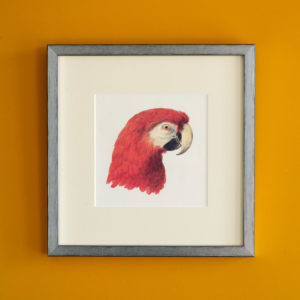
Parrot Heads after Aert Schouman, ‘Arakanga’,
£195 each -
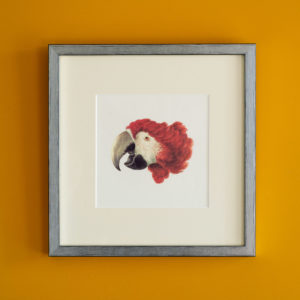
Parrot Heads after Aert Schouman, ‘The Ara Head’,
£195 each -
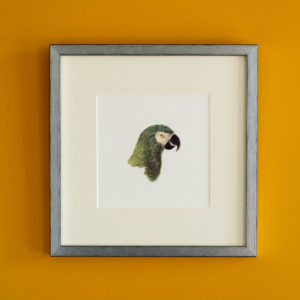
Parrot Heads after Aert Schouman, ‘The Maracana Ara’,
£195 each -
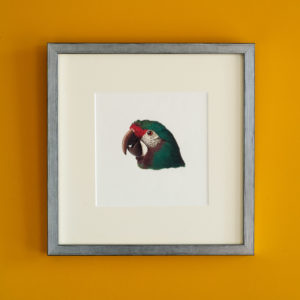
Parrot Heads after Aert Schouman, ‘The great military Ara’,
£195 each -
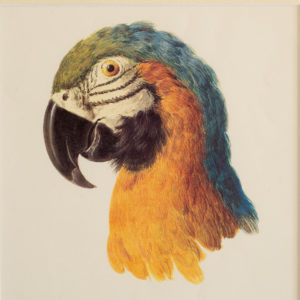
Parrot Heads after Aert Schouman, ‘The Ararauna’,
£195 each -
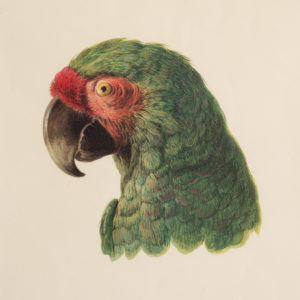
Parrot Heads after Aert Schouman, ‘The Military Ara’,
£195 each -
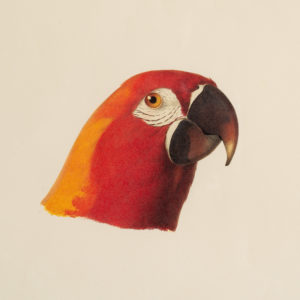
Parrot Heads after Aert Schouman, ‘The Tricolour Ara’,
£195 each -
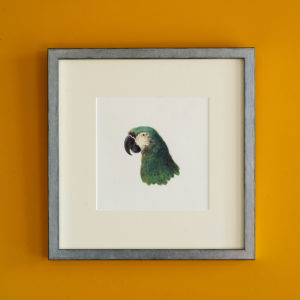
Parrot Heads after Aert Schouman, ‘The Macaronana Ara’,
£195 each -
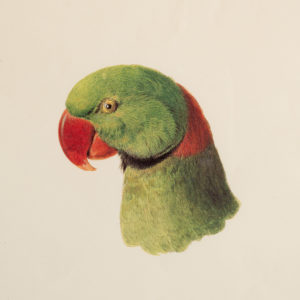
Parrot Heads after Aert Schouman, ‘Great-collared Parakeet’,
£195 each -
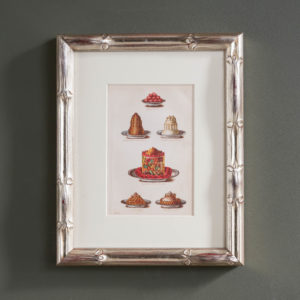
Mrs Beeton, original chromolithographs
£195 eachMrs Beeton, original chromolithographs
Isabella Mary Beeton was an English journalist, editor and writer. In 1859 with her husband, Mrs Beeton launched a series of 48-page monthly supplements to The Englishwoman's Domestic Magazine; the 24 instalments were published in one volume as Mrs Beeton's Book of Household Management.£195 each -
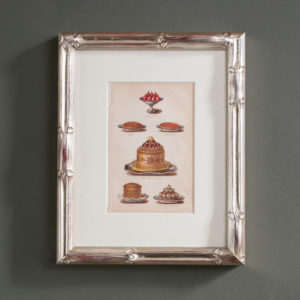
Mrs Beeton, original chromolithographs
£195 eachMrs Beeton, original chromolithographs
Isabella Mary Beeton was an English journalist, editor and writer. In 1859 with her husband, Mrs Beeton launched a series of 48-page monthly supplements to The Englishwoman's Domestic Magazine; the 24 instalments were published in one volume as Mrs Beeton's Book of Household Management.£195 each -
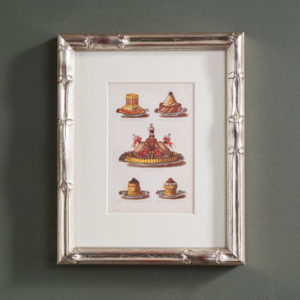
Mrs Beeton, original chromolithographs
£195 eachMrs Beeton, original chromolithographs
Isabella Mary Beeton was an English journalist, editor and writer. In 1859 with her husband, Mrs Beeton launched a series of 48-page monthly supplements to The Englishwoman's Domestic Magazine; the 24 instalments were published in one volume as Mrs Beeton's Book of Household Management.£195 each -
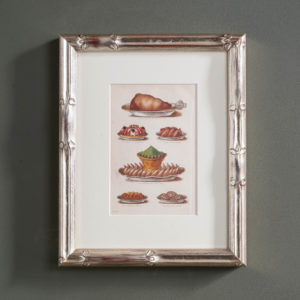
Mrs Beeton, original chromolithographs
£195 eachMrs Beeton, original chromolithographs
Isabella Mary Beeton was an English journalist, editor and writer. In 1859 the with her husband Mrs Beeton launched a series of 48-page monthly supplements to The Englishwoman's Domestic Magazine; the 24 instalments were published in one volume as Mrs Beeton's Book of Household Management.£195 each -
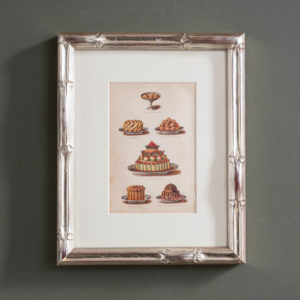
Mrs Beeton, original chromolithographs
£195 eachMrs Beeton, original chromolithographs
Isabella Mary Beeton was an English journalist, editor and writer. In 1859 with her husband, Mrs Beeton launched a series of 48-page monthly supplements to The Englishwoman's Domestic Magazine; the 24 instalments were published in one volume as Mrs Beeton's Book of Household Management.£195 each -
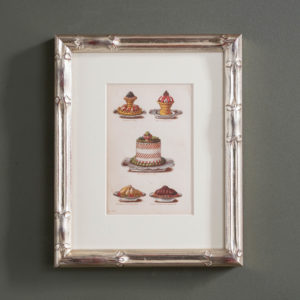
Mrs Beeton, original chromolithographs
£195 eachMrs Beeton, original chromolithographs
Isabella Mary Beeton was an English journalist, editor and writer. In 1859 with her husband, Mrs Beeton launched a series of 48-page monthly supplements to The Englishwoman's Domestic Magazine; the 24 instalments were published in one volume as Mrs Beeton's Book of Household Management.£195 each -
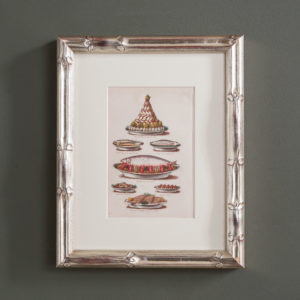
Mrs Beeton, original chromolithographs
£195 eachMrs Beeton, original chromolithographs
Isabella Mary Beeton was an English journalist, editor and writer. In 1859 with her husband, Mrs Beeton launched a series of 48-page monthly supplements to The Englishwoman's Domestic Magazine; the 24 instalments were published in one volume as Mrs Beeton's Book of Household Management.£195 each -

Mrs Beeton, original chromolithographs
£195 eachMrs Beeton, original chromolithographs
Isabella Mary Beeton was an English journalist, editor and writer. In 1859 with her husband, Mrs Beeton launched a series of 48-page monthly supplements to The Englishwoman's Domestic Magazine; the 24 instalments were published in one volume as Mrs Beeton's Book of Household Management.£195 each -
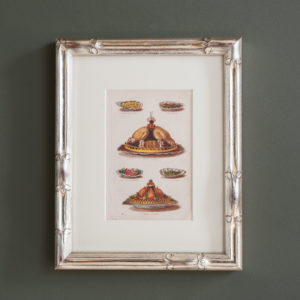
Mrs Beeton, original chromolithographs
£195 eachMrs Beeton, original chromolithographs
Isabella Mary Beeton was an English journalist, editor and writer. In 1859 with her husband, Mrs Beeton launched a series of 48-page monthly supplements to The Englishwoman's Domestic Magazine; the 24 instalments were published in one volume as Mrs Beeton's Book of Household Management.£195 each -
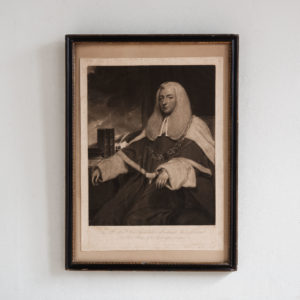
Sir Archibald Macdonald, Knight and Baronet.
£190Sir Archibald Macdonald, Knight and Baronet.
A framed and mounted three-quarter-length mezzotint portrait of Sir Archibald Macdonald, 1st Baronet by by Henry Meyer. Sir Archibald Macdonald, 1st Baronet (13 July 1747 – 18 May 1826) was Scottish-born English lawyer, judge and politician. Born at Armadale Castle on The Isle of Skye, he was sent to England early to keep him away from Jacobite influence. He attended Westminster School from 1760 from where he went on to Christ Church, Oxford, graduating B.A. in 1768 and M.A. in 1772. He was subsequently called to the bar at Lincoln's Inn. Initially a Whig he later joined the King's party and as King's Counsel he was an enthusiastic prosecutor of Radicals, including the pamphleteer and agitator Thomas Paine for his Rights of Man in December 1792. A convivial man, he was nicknamed ‘the Arabian knight' in his lifetime for apparently having 'a thousand and one tales'. He is shown sitting in armchair, in wig and judicial robes; books, quill pen, inkpot by window at left£190 -
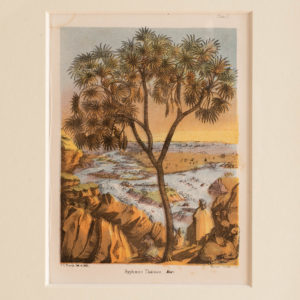
Popular History of the Palms and their Allies – Hyphaene Thebaica
£180 eachPopular History of the Palms and their Allies – Hyphaene Thebaica
Based on the work of Berthold Seemann ,was a botanist who made his name when he was appointed naturalist (on the recommendation of W J Hooker) to HMS Herald for the Kellett voyage of exploration to the American West Coast and Pacific.£180 each -
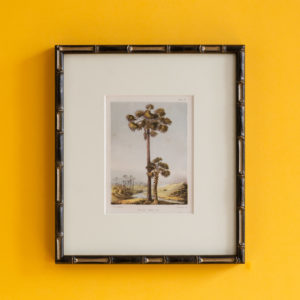
Popular History of the Palms and their Allies – Mauritia vinifera
£180 eachPopular History of the Palms and their Allies – Mauritia vinifera
Based on the work of Berthold Seemann ,was a botanist who made his name when he was appointed naturalist (on the recommendation of W J Hooker) to HMS Herald for the Kellett voyage of exploration to the American West Coast and Pacific.£180 each -
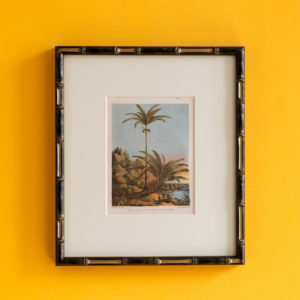
Popular History of the Palms and their Allies – Elaeis melanococca & Iriartea exorrhiza
£180 eachPopular History of the Palms and their Allies – Elaeis melanococca & Iriartea exorrhiza
Based on the work of Berthold Seemann ,was a botanist who made his name when he was appointed naturalist (on the recommendation of W J Hooker) to HMS Herald for the Kellett voyage of exploration to the American West Coast and Pacific.£180 each -
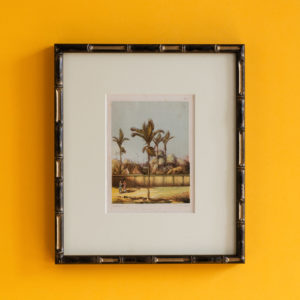
Popular History of the Palms and their Allies – Areca catechu
£180 eachPopular History of the Palms and their Allies – Areca catechu
Based on the work of Berthold Seemann ,was a botanist who made his name when he was appointed naturalist (on the recommendation of W J Hooker) to HMS Herald for the Kellett voyage of exploration to the American West Coast and Pacific.£180 each -

Popular History of the Palms and their Allies – Acrocomia Mexicana & Chamaedorea Schiedeana
£180 eachPopular History of the Palms and their Allies – Acrocomia Mexicana & Chamaedorea Schiedeana
Based on the work of Berthold Seemann ,was a botanist who made his name when he was appointed naturalist (on the recommendation of W J Hooker) to HMS Herald for the Kellett voyage of exploration to the American West Coast and Pacific.£180 each -
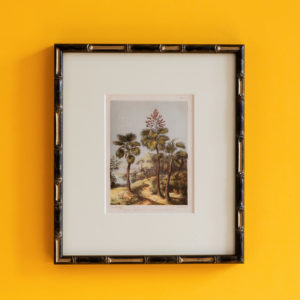
Popular History of the Palms and their Allies – Borassus flabelliformis & Corypha umbraculifera
£180 eachPopular History of the Palms and their Allies – Borassus flabelliformis & Corypha umbraculifera
Based on the work of Berthold Seemann ,was a botanist who made his name when he was appointed naturalist (on the recommendation of W J Hooker) to HMS Herald for the Kellett voyage of exploration to the American West Coast and Pacific.£180 each -
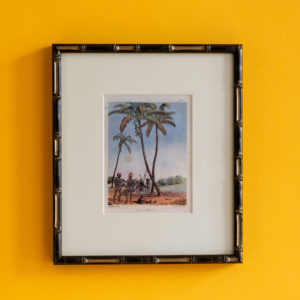
Popular History of the Palms and their Allies – Cocos nucifera
£180 eachPopular History of the Palms and their Allies – Cocos nucifera
Based on the work of Berthold Seemann ,was a botanist who made his name when he was appointed naturalist (on the recommendation of W J Hooker) to HMS Herald for the Kellett voyage of exploration to the American West Coast and Pacific.£180 each -
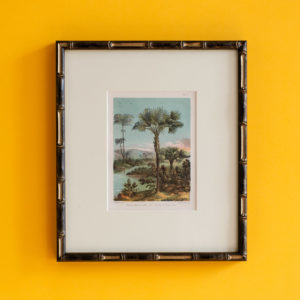
Popular History of the Palms and their Allies – Oreodoxa oleracea & Thrinax multiflora
£180 eachPopular History of the Palms and their Allies – Oreodoxa oleracea & Thrinax multiflora
Based on the work of Berthold Seemann ,was a botanist who made his name when he was appointed naturalist (on the recommendation of W J Hooker) to HMS Herald for the Kellett voyage of exploration to the American West Coast and Pacific.£180 each -
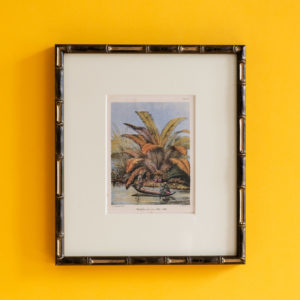
Popular History of the Palms and their Allies – Phytelephas macrocarpa
£180 eachPopular History of the Palms and their Allies – Phytelephas macrocarpa
Based on the work of Berthold Seemann ,was a botanist who made his name when he was appointed naturalist (on the recommendation of W J Hooker) to HMS Herald for the Kellett voyage of exploration to the American West Coast and Pacific.£180 each -
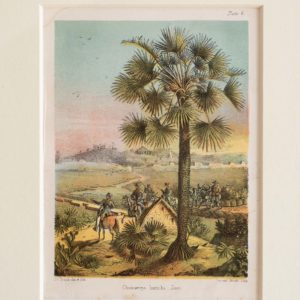
Popular History of the Palms and their Allies – Chamaerops humilis
£180 eachPopular History of the Palms and their Allies – Chamaerops humilis
Based on the work of Berthold Seemann ,was a botanist who made his name when he was appointed naturalist (on the recommendation of W J Hooker) to HMS Herald for the Kellett voyage of exploration to the American West Coast and Pacific.£180 each -
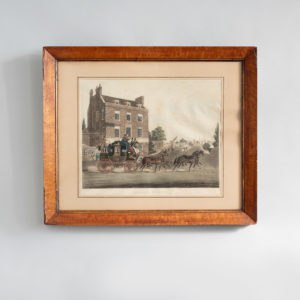
The Quicksilver
£180The Quicksilver
A Royal Mail coach, The Quicksilver, passes the Star and Garter at the Brentford end of Kew Bridge. The Quicksilver was the London to Falmouth Royal Mail Coach and operated in the years between 1835 and 1859. In 1837 it became the fastest long-distance mail coach in England with an average speed of 10.25 miles an hour with the London to Falmouth journey being accomplished in 16 hours and 34 minutes. The Star and Garter was a venerable old Coaching Inn positioned on the Middlesex shore of the Thames by Kew Bridge. It closed in 1983. Mounted and framed in an angled maple frame.£180 -
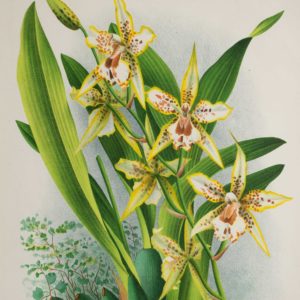
Linden Botanicals, Odontoglossum Duvivieranum,
£175 eachLinden Botanicals, Odontoglossum Duvivieranum,
L’Illustration Horticole, was a monthly horticultural review, founded in 1854 in Ghent, Belgium, by Ambroise Verschaffelt, a nurseryman who specialised in new plant introductions from South America. The lavish illustrations were produced by some of the very best botanical artists and lithographers – A. Goosens, P. De Pannemaeker and J. Goffart. The L’Illustration Horticole although founded by Jean Jules Linden (1817 – 1898) became a collaborative effort of many great horticulturists and field botanists of the day. Jean Linden in his own right was a renowned orchid grower and collector. Each monthly edition featured chromolithograph of botanical prints. Plants such as orchids, camellias, roses and leafy plants such as ferns and palm trees were represented. The magazine’s scope included pictures, descriptions, the history and culture of “the most remarkable plants,” new introductions, horticultural history, botanical expeditions, and accounts of the major expositions and of new works on botany and horticulture as well as garden descriptions and layouts.£175 each -
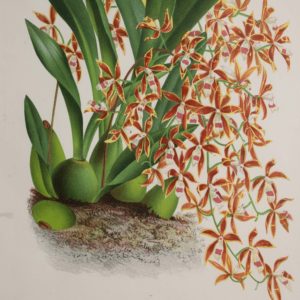
Linden Botanicals, Odontoglossum Constricutum,
£175 eachLinden Botanicals, Odontoglossum Constricutum,
L’Illustration Horticole, was a monthly horticultural review, founded in 1854 in Ghent, Belgium, by Ambroise Verschaffelt, a nurseryman who specialised in new plant introductions from South America. The lavish illustrations were produced by some of the very best botanical artists and lithographers – A. Goosens, P. De Pannemaeker and J. Goffart. The L’Illustration Horticole although founded by Jean Jules Linden (1817 – 1898) became a collaborative effort of many great horticulturists and field botanists of the day. Jean Linden in his own right was a renowned orchid grower and collector. Each monthly edition featured chromolithograph of botanical prints. Plants such as orchids, camellias, roses and leafy plants such as ferns and palm trees were represented. The magazine’s scope included pictures, descriptions, the history and culture of “the most remarkable plants,” new introductions, horticultural history, botanical expeditions, and accounts of the major expositions and of new works on botany and horticulture as well as garden descriptions and layouts.£175 each -
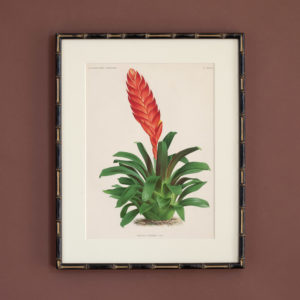
Linden Botanicals, Vriesea Fulgida,
£175 eachLinden Botanicals, Vriesea Fulgida,
L’Illustration Horticole, was a monthly horticultural review, founded in 1854 in Ghent, Belgium, by Ambroise Verschaffelt, a nurseryman who specialised in new plant introductions from South America. The lavish illustrations were produced by some of the very best botanical artists and lithographers – A. Goosens, P. De Pannemaeker and J. Goffart. The L’Illustration Horticole although founded by Jean Jules Linden (1817 – 1898) became a collaborative effort of many great horticulturists and field botanists of the day. Jean Linden in his own right was a renowned orchid grower and collector. Each monthly edition featured chromolithograph of botanical prints. Plants such as orchids, camellias, roses and leafy plants such as ferns and palm trees were represented. The magazine’s scope included pictures, descriptions, the history and culture of “the most remarkable plants,” new introductions, horticultural history, botanical expeditions, and accounts of the major expositions and of new works on botany and horticulture as well as garden descriptions and layouts.£175 each -
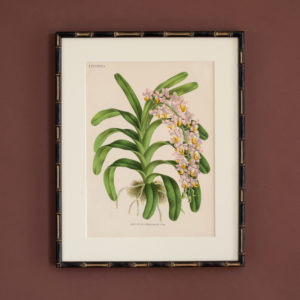
Linden Botanicals, Aerides Reichenbachi,
£175 eachLinden Botanicals, Aerides Reichenbachi,
L’Illustration Horticole, was a monthly horticultural review, founded in 1854 in Ghent, Belgium, by Ambroise Verschaffelt, a nurseryman who specialised in new plant introductions from South America. The lavish illustrations were produced by some of the very best botanical artists and lithographers – A. Goosens, P. De Pannemaeker and J. Goffart. The L’Illustration Horticole although founded by Jean Jules Linden (1817 – 1898) became a collaborative effort of many great horticulturists and field botanists of the day. Jean Linden in his own right was a renowned orchid grower and collector. Each monthly edition featured chromolithograph of botanical prints. Plants such as orchids, camellias, roses and leafy plants such as ferns and palm trees were represented. The magazine’s scope included pictures, descriptions, the history and culture of “the most remarkable plants,” new introductions, horticultural history, botanical expeditions, and accounts of the major expositions and of new works on botany and horticulture as well as garden descriptions and layouts.£175 each -
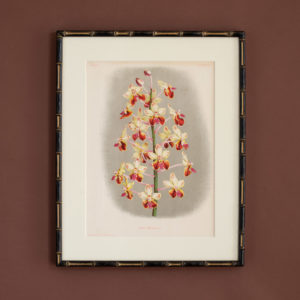
Linden Botanicals, Vanda Superba,
£175 eachLinden Botanicals, Vanda Superba,
L’Illustration Horticole, was a monthly horticultural review, founded in 1854 in Ghent, Belgium, by Ambroise Verschaffelt, a nurseryman who specialised in new plant introductions from South America. The lavish illustrations were produced by some of the very best botanical artists and lithographers – A. Goosens, P. De Pannemaeker and J. Goffart. The L’Illustration Horticole although founded by Jean Jules Linden (1817 – 1898) became a collaborative effort of many great horticulturists and field botanists of the day. Jean Linden in his own right was a renowned orchid grower and collector. Each monthly edition featured chromolithograph of botanical prints. Plants such as orchids, camellias, roses and leafy plants such as ferns and palm trees were represented. The magazine’s scope included pictures, descriptions, the history and culture of “the most remarkable plants,” new introductions, horticultural history, botanical expeditions, and accounts of the major expositions and of new works on botany and horticulture as well as garden descriptions and layouts.£175 each -
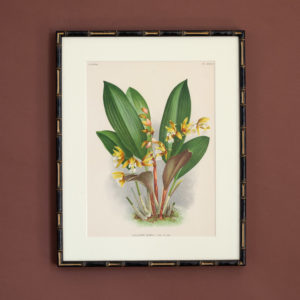
Linden Botanicals, Coelogyne Lurida,
£175 eachLinden Botanicals, Coelogyne Lurida,
L’Illustration Horticole, was a monthly horticultural review, founded in 1854 in Ghent, Belgium, by Ambroise Verschaffelt, a nurseryman who specialised in new plant introductions from South America. The lavish illustrations were produced by some of the very best botanical artists and lithographers – A. Goosens, P. De Pannemaeker and J. Goffart. The L’Illustration Horticole although founded by Jean Jules Linden (1817 – 1898) became a collaborative effort of many great horticulturists and field botanists of the day. Jean Linden in his own right was a renowned orchid grower and collector. Each monthly edition featured chromolithograph of botanical prints. Plants such as orchids, camellias, roses and leafy plants such as ferns and palm trees were represented. The magazine’s scope included pictures, descriptions, the history and culture of “the most remarkable plants,” new introductions, horticultural history, botanical expeditions, and accounts of the major expositions and of new works on botany and horticulture as well as garden descriptions and layouts.£175 each -
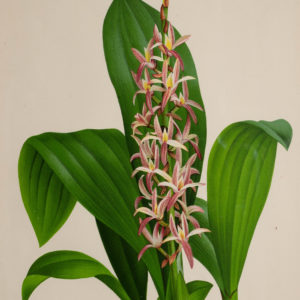
Linden Botanicals, Eria Striolata,
£175 eachLinden Botanicals, Eria Striolata,
L’Illustration Horticole, was a monthly horticultural review, founded in 1854 in Ghent, Belgium, by Ambroise Verschaffelt, a nurseryman who specialised in new plant introductions from South America. The lavish illustrations were produced by some of the very best botanical artists and lithographers – A. Goosens, P. De Pannemaeker and J. Goffart. The L’Illustration Horticole although founded by Jean Jules Linden (1817 – 1898) became a collaborative effort of many great horticulturists and field botanists of the day. Jean Linden in his own right was a renowned orchid grower and collector. Each monthly edition featured chromolithograph of botanical prints. Plants such as orchids, camellias, roses and leafy plants such as ferns and palm trees were represented. The magazine’s scope included pictures, descriptions, the history and culture of “the most remarkable plants,” new introductions, horticultural history, botanical expeditions, and accounts of the major expositions and of new works on botany and horticulture as well as garden descriptions and layouts.£175 each -
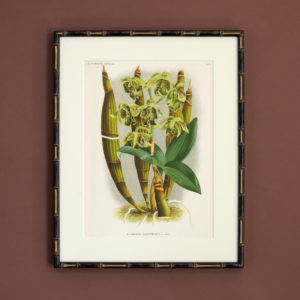
Linden Botanicals, Dendiobium Macrophyllum,
£175 eachLinden Botanicals, Dendiobium Macrophyllum,
L’Illustration Horticole, was a monthly horticultural review, founded in 1854 in Ghent, Belgium, by Ambroise Verschaffelt, a nurseryman who specialised in new plant introductions from South America. The lavish illustrations were produced by some of the very best botanical artists and lithographers – A. Goosens, P. De Pannemaeker and J. Goffart. The L’Illustration Horticole although founded by Jean Jules Linden (1817 – 1898) became a collaborative effort of many great horticulturists and field botanists of the day. Jean Linden in his own right was a renowned orchid grower and collector. Each monthly edition featured chromolithograph of botanical prints. Plants such as orchids, camellias, roses and leafy plants such as ferns and palm trees were represented. The magazine’s scope included pictures, descriptions, the history and culture of “the most remarkable plants,” new introductions, horticultural history, botanical expeditions, and accounts of the major expositions and of new works on botany and horticulture as well as garden descriptions and layouts.£175 each -
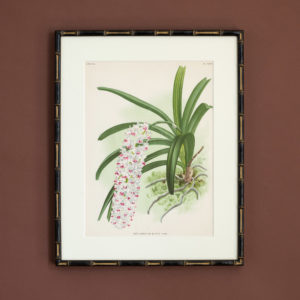
Linden Botanicals, Rhynchostylis Retusa,
£175 eachLinden Botanicals, Rhynchostylis Retusa,
L’Illustration Horticole, was a monthly horticultural review, founded in 1854 in Ghent, Belgium, by Ambroise Verschaffelt, a nurseryman who specialised in new plant introductions from South America. The lavish illustrations were produced by some of the very best botanical artists and lithographers – A. Goosens, P. De Pannemaeker and J. Goffart. The L’Illustration Horticole although founded by Jean Jules Linden (1817 – 1898) became a collaborative effort of many great horticulturists and field botanists of the day. Jean Linden in his own right was a renowned orchid grower and collector. Each monthly edition featured chromolithograph of botanical prints. Plants such as orchids, camellias, roses and leafy plants such as ferns and palm trees were represented. The magazine’s scope included pictures, descriptions, the history and culture of “the most remarkable plants,” new introductions, horticultural history, botanical expeditions, and accounts of the major expositions and of new works on botany and horticulture as well as garden descriptions and layouts.£175 each -
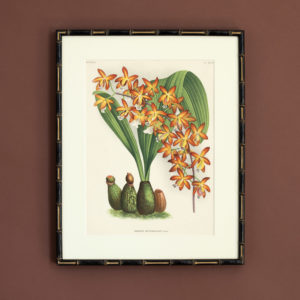
Linden Botanicals, Eriopsis Rutidobulbon,
£175 eachLinden Botanicals, Eriopsis Rutidobulbon,
L’Illustration Horticole, was a monthly horticultural review, founded in 1854 in Ghent, Belgium, by Ambroise Verschaffelt, a nurseryman who specialised in new plant introductions from South America. The lavish illustrations were produced by some of the very best botanical artists and lithographers – A. Goosens, P. De Pannemaeker and J. Goffart. The L’Illustration Horticole although founded by Jean Jules Linden (1817 – 1898) became a collaborative effort of many great horticulturists and field botanists of the day. Jean Linden in his own right was a renowned orchid grower and collector. Each monthly edition featured chromolithograph of botanical prints. Plants such as orchids, camellias, roses and leafy plants such as ferns and palm trees were represented. The magazine’s scope included pictures, descriptions, the history and culture of “the most remarkable plants,” new introductions, horticultural history, botanical expeditions, and accounts of the major expositions and of new works on botany and horticulture as well as garden descriptions and layouts.£175 each -
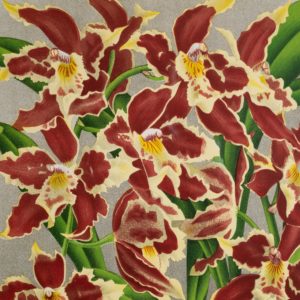
Linden Botanicals, Odontoglossum Crispum,
£175 eachLinden Botanicals, Odontoglossum Crispum,
L’Illustration Horticole, was a monthly horticultural review, founded in 1854 in Ghent, Belgium, by Ambroise Verschaffelt, a nurseryman who specialised in new plant introductions from South America. The lavish illustrations were produced by some of the very best botanical artists and lithographers – A. Goosens, P. De Pannemaeker and J. Goffart. The L’Illustration Horticole although founded by Jean Jules Linden (1817 – 1898) became a collaborative effort of many great horticulturists and field botanists of the day. Jean Linden in his own right was a renowned orchid grower and collector. Each monthly edition featured chromolithograph of botanical prints. Plants such as orchids, camellias, roses and leafy plants such as ferns and palm trees were represented. The magazine’s scope included pictures, descriptions, the history and culture of “the most remarkable plants,” new introductions, horticultural history, botanical expeditions, and accounts of the major expositions and of new works on botany and horticulture as well as garden descriptions and layouts.£175 each -
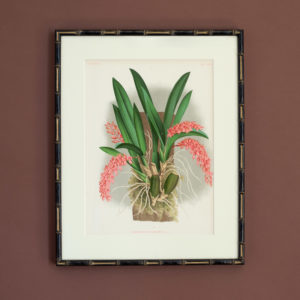
Linden Botanicals, Rodriguezia Bungerothi,
£175 eachLinden Botanicals, Rodriguezia Bungerothi,
L’Illustration Horticole, was a monthly horticultural review, founded in 1854 in Ghent, Belgium, by Ambroise Verschaffelt, a nurseryman who specialised in new plant introductions from South America. The lavish illustrations were produced by some of the very best botanical artists and lithographers – A. Goosens, P. De Pannemaeker and J. Goffart. The L’Illustration Horticole although founded by Jean Jules Linden (1817 – 1898) became a collaborative effort of many great horticulturists and field botanists of the day. Jean Linden in his own right was a renowned orchid grower and collector. Each monthly edition featured chromolithograph of botanical prints. Plants such as orchids, camellias, roses and leafy plants such as ferns and palm trees were represented. The magazine’s scope included pictures, descriptions, the history and culture of “the most remarkable plants,” new introductions, horticultural history, botanical expeditions, and accounts of the major expositions and of new works on botany and horticulture as well as garden descriptions and layouts.£175 each -
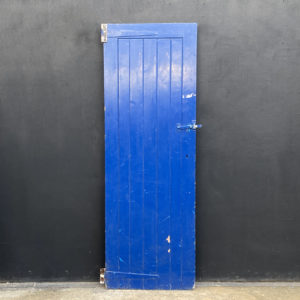
An English ledged and braced pine outhouse door
£165An English ledged and braced pine outhouse door
planked to the obverse with a Suffolk latch, painted blue,£165 -
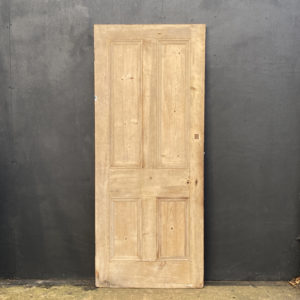
A Victorian pine four panel door
£165 -
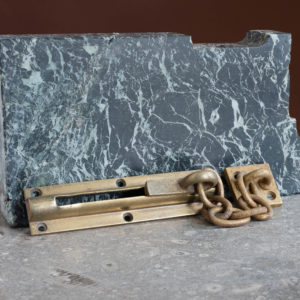
Late Victorian brass night chain,
£160 -
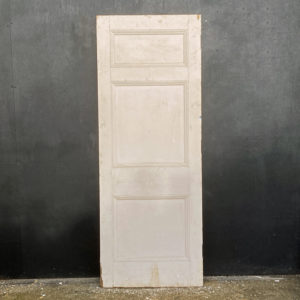
An English three panel pine door
£155 -
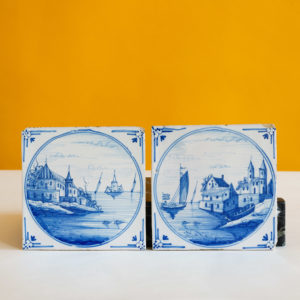
Two Good Blue and White Delft tiles,
£150 the pairTwo Good Blue and White Delft tiles,
The nineteenth century tiles typical in their blue and white decoration are executed with more detail than is usually seen on such tiles. Both having scenes that incorporate seascapes, boats, churches and harbours with slipways. Both painted within roundels with angular decoration to each corner.£150 the pair -
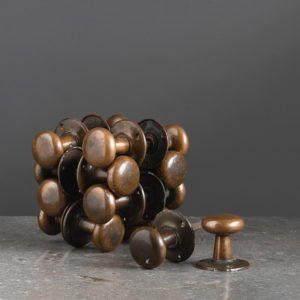
Patinated brass ‘Capstan’ door knob
£145 -
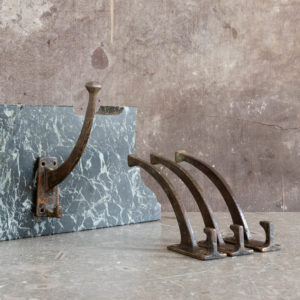
Four Edwardian iron coat hooks
£140 the set -
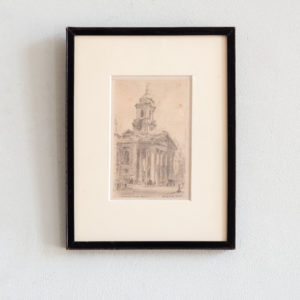
St. George’s Hanover Square
£140St. George’s Hanover Square
One of the Fifty Churches projected by Queen Anne's Act of 1711, it was built between 1721-1724 to the designs of John James.£140 -
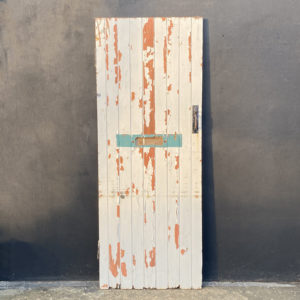
An English ledged and braced painted pine cottage door
£135 -
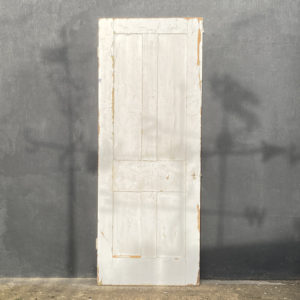
A Victorian four panel painted pine door
£135 -
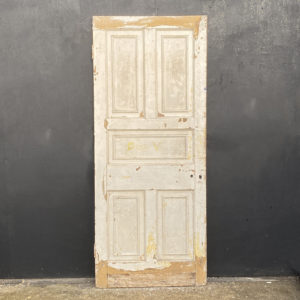
An English five panel painted pine door
£135An English five panel painted pine door
two rectangular panels above a landscape panel above another pair of rectangular panels to each side£135 -
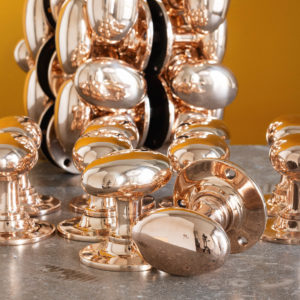
Early twentieth century oval door knobs
£130 a pair -
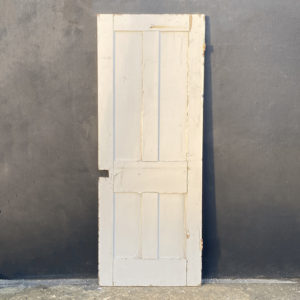
A Victorian four panel painted pine door
£125 -

A Victorian four panel painted pine door
£125 -
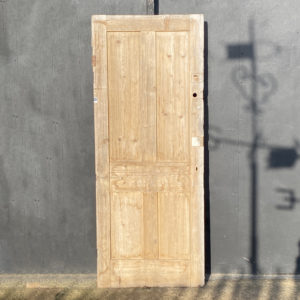
A Victorian four panel pine door
£125 -
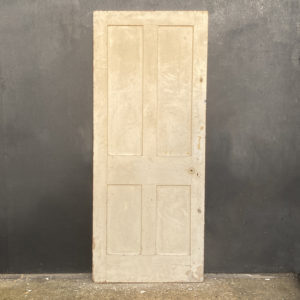
A four panel painted pine door
£125 -

Edwardian cut glass water pitcher,
£125 -
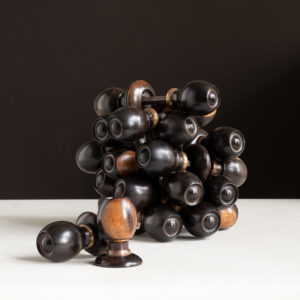
Twentieth century turned ebony door knobs
£125 each pairTwentieth century turned ebony door knobs
showing heart and sap wood, available individually.£125 each pair -
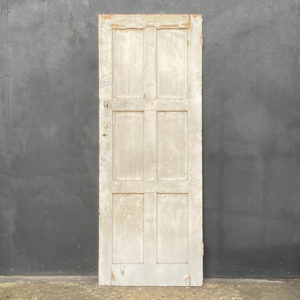
A six panel painted painted pine door
£120 -
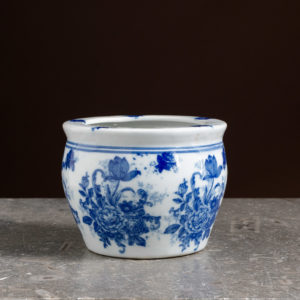
A Small Blue and White transfer printed gold fish bowl.
£120A Small Blue and White transfer printed gold fish bowl.
The late nineteenth century European made porcelain bowl, produced to mimic a Chinese gold fish bowl. The wide rim designed to stop fish escaping, is decorated with blue flower heads, above a bulbous body decorated with layered flower designs. The mark on the base in the form of a simple windmill could indicate the piece was produced in Holland.£120 -
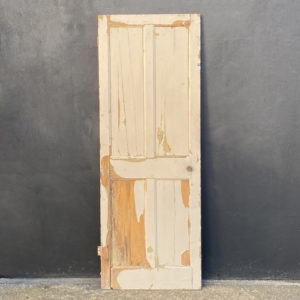
A four panel pine door
£115 -
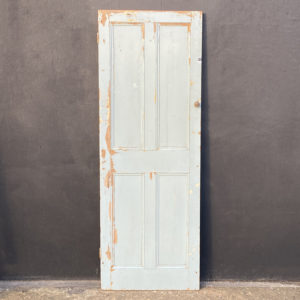
A four panel painted pine door
£115
Featured Items
-
No records found

